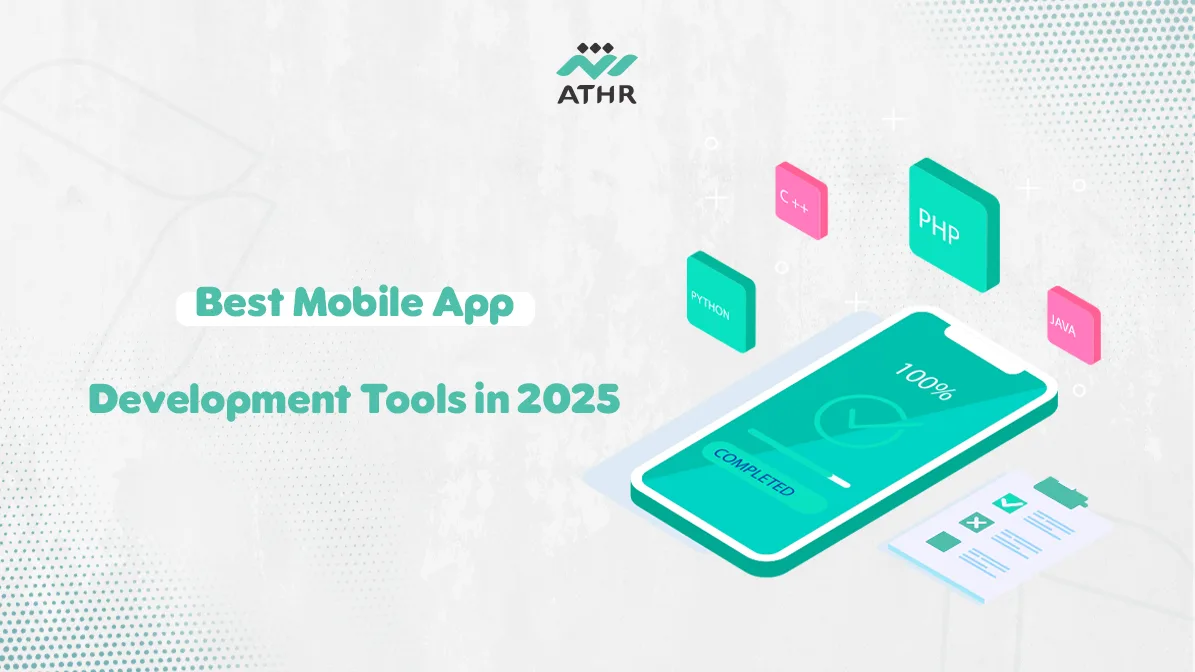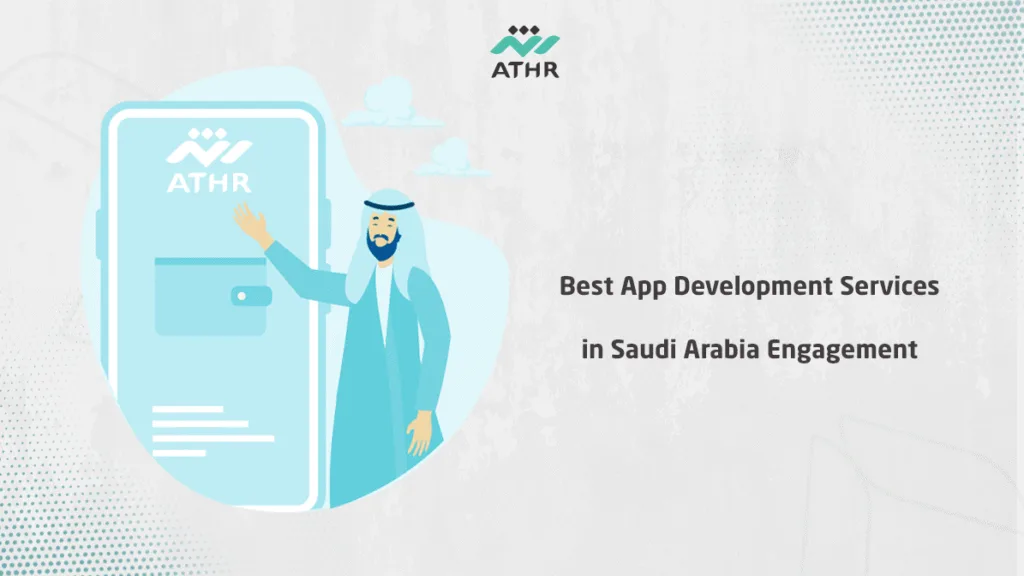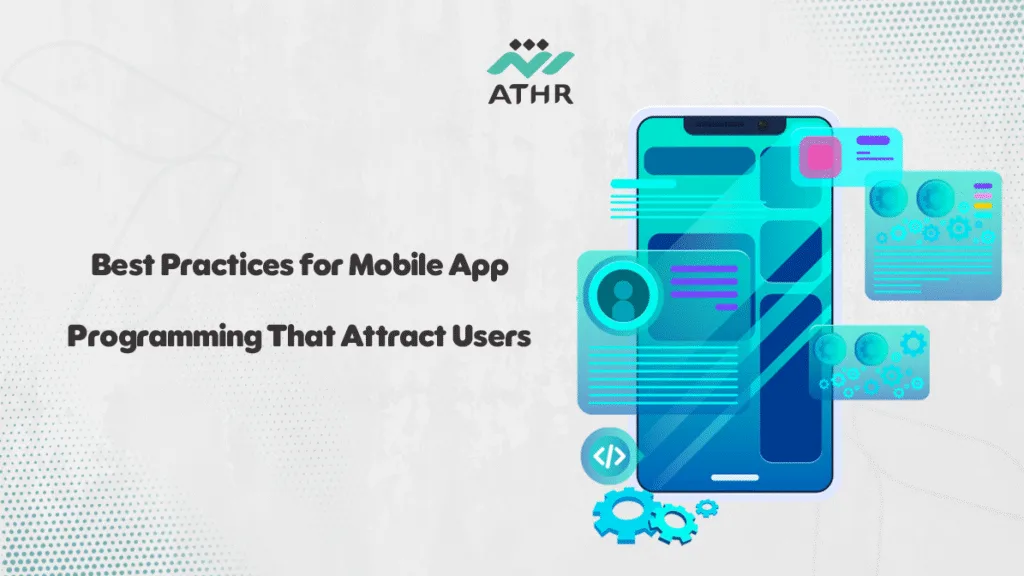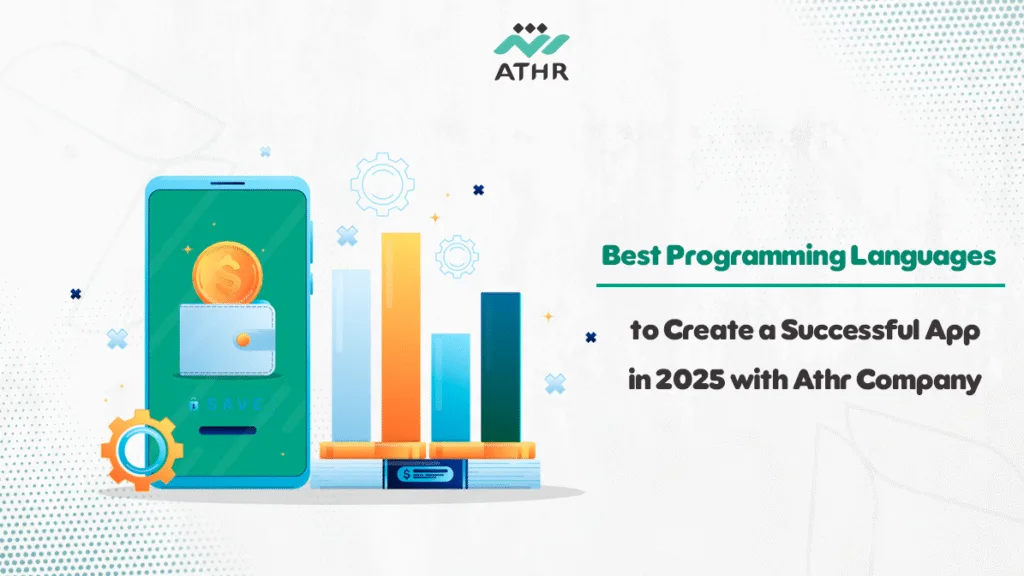2025 is the year of smart applications, with the emergence of amazing development tools that facilitate the rapid creation of professional apps. Whether you are a company or an idea owner, choosing the right tool is key to success. Learn about the most important app development tools like Flutter, React Native, and Kotlin.
📞Talk to Athr experts to determine the most suitable tool for your next application.
How to Choose the Right Tool for Your Mobile App Development
Choosing the perfect app development tool is the first step toward building a successful application in terms of performance and user experience. With a multitude of tools such as Flutter, React Native, Swift, Kotlin, and others, the decision can seem difficult. However, by following a measured methodology, you can accurately determine what suits your project’s needs.
Steps to Evaluate Your Project Needs Before Choosing
Before you start writing the first line of code, you must understand your project in depth through the following steps:
- Clearly define the app’s goals:
Is your goal to launch a commercial app? A game? Or a service platform? Each type requires different technologies in terms of speed and integration with systems. - Understand your target audience:
Apps aimed at iOS users may need different tools than those used for Android or hybrid apps. - Assess your development team’s capabilities:
Some tools like Flutter or React Native rely on specific skills, so choosing a tool your team knows well saves time and money. - Test the development environment:
Try more than one tool by building a Prototype to compare development speed and ease of testing.
Factors to Consider: App Type, Team, Budget
When choosing a mobile app design and development tool, consider the following factors:
- App Type:
3D game apps like Unity or Unreal Engine are different from service apps like Flutter or Kotlin. - Team Size and Expertise:
If you have a small or limited-experience team, choosing a tool that offers a flexible and easy-to-use development environment will be better. - 💰 Budget and Time:
Open-source tools like React Native and Flutter reduce costs compared to proprietary tools like Swift (for iOS only). - ⚙️ Integration with Other Systems:
Ensure the tool supports the APIs (Application Programming Interfaces) and platforms your app requires.
When you collaborate with Athr for Programming and App Design, you will get a team that meticulously studies your project to choose the most suitable tool for your goals and budget, ensuring exceptional performance and a carefully calculated development cost that achieves the best return on investment.
Save your time and effort! 📞Contact Athr and let us set a realistic and profitable execution plan for your next app.
The Strongest Mobile App Development Tools That Topped 2025

2025 is the year of smart development, where mobile app development tools have become faster and more flexible than ever. With the click of a button, you can build a professional app that suits your audience and runs smoothly on all operating systems.
The result? ✅ Distinguished performance and a user experience that solidifies your success in the digital market.
Below, we review the most important mobile app development tools in 2025, highlighting their features and how they can help you create a successful app that suits your needs and goals.
Flutter – The First Choice for Cross-Platform App Development
It is considered one of the strongest Android and iOS app development technologies in 2025, thanks to its flexibility and speed of production. Google offers this free, open-source tool to allow developers to build Cross-Platform applications using a single codebase in the Dart language.
Key Advantages of Flutter:
- ⚡ Fast Development: The Hot Reload feature allows you to see modifications instantly without restarting the application.
- 🎨 Attractive UI Design: The Widgets library grants a seamless user experience and a professional look.
- 💼 Lower Cost: Because it saves time and effort in developing two different versions (Android and iOS).
- Huge Support Community: Which makes troubleshooting faster and Google updates continuous.
When to Choose Flutter?
Choose it if you:
- Want to launch an app quickly on more than one platform.
- Have a small development team.
- Are looking for a perfect balance between performance and flexibility.
📖 Continue reading: Mobile App Design using Flutter and React Native: A Comprehensive Comparison
React Native – Strong Performance and Distinct User Experience
React Native from Meta (Facebook) remains on the list of the best mobile app creation software in 2025, due to its high performance and the possibility of code reuse across different platforms.
Key Advantages of React Native:
- Shared Codebase: You can easily build a single application that runs on both Android and iOS.
- Strong Integration with Native APIs: Which gives the user performance very close to native applications.
- Global Developer Community: Thousands of ready-made Plugins and libraries facilitate development.
- Continuous Support from Major Companies: Such as Instagram, Tesla, and Shopify.
When to Choose React Native?
- If your app relies on a rich, interactive graphics user experience.
- Or if you have a website running on React and want to convert it into a mobile app.
💡The Instagram app uses React Native to reduce the time for updates between operating systems, while significantly improving performance in user interfaces.
Swift and Kotlin – Tools for Specialist Developers
If you are looking for 100% native performance and complete integration with operating systems, then Swift and Kotlin are the ideal choices for iOS and Android applications, respectively.
Swift – For Native iOS Applications
- A secure and modern language from Apple.
- Provides superior performance in complex applications such as financial and medical services.
- Ideal for projects that require deep integration with system components such as the camera or AI.
Kotlin – For Advanced Android Applications
- Officially approved by Google for Android app development.
- Fully compatible with Java, making it easy to update old projects.
- Supports asynchronous programming (Coroutines) for a faster and smoother experience.
📍 There is no single perfect tool for everyone; the right tool is the one that serves your project’s goals, budget, and team. This is why Athr for Programming and Digital Marketing offers customized consultations to select the best technologies, whether you are looking for a multi-platform app using Flutter, or a fully integrated native app using Swift or Kotlin.
📖 Click here to view the complete guide to optimizing performance on Android and iOS
Comparison Between Android and iOS App Development Tools in 2025
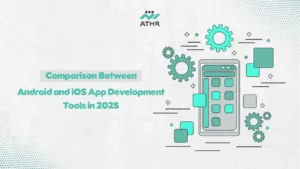
When it comes to choosing mobile app development tools, understanding the differences between Android and iOS tools is an essential step towards building a successful, smartly performing application. Each system has distinct tools and technologies, and with the evolution of modern development platforms, comparing these tools has become necessary to select the most appropriate solution that ensures a seamless user experience and high-quality performance on both systems.
Native Tools for Android Applications
Android app development relies heavily on languages and tools that support the Google environment, such as Kotlin and Android Studio. These tools give you complete control over the code and easy integration with Google services like Firebase and the Play Store.
Key Tools in 2025:
- Kotlin: The official language for Android development, combining simplicity and power.
- Android Studio: An integrated development environment (IDE) that allows testing apps on various virtual devices.
- Jetpack Compose: A modern library for building user interfaces quickly and smoothly.
📲 If you are targeting a wide audience on Android devices, choosing Kotlin with Android Studio is the safest and most efficient solution.
Native Tools for iPhone (iOS) Applications
In the Apple environment, development relies on powerful tools focused on performance and deep system integration, such as Swift and Xcode.
These tools are used to develop high-quality apps that meet the stringent requirements of the App Store.
Key Tools in 2025:
- Swift: A smart, fast programming language from Apple, used in the development of most modern iOS applications.
- Xcode: A powerful development environment that allows for easy creation, testing, and deployment of applications.
- SwiftUI: A modern interface framework that provides a visual and fast development experience.
Choose Swift if you are looking for a native iOS application with perfect performance and a professional user experience.
Cross-Platform Tools (Shared between the two systems)
In 2025, the popularity of Cross-Platform tools has increased, allowing developers to build a single application that runs on both Android and iOS with the same efficiency. These tools have become the preferred choice for startups looking to save time and cost without sacrificing quality.
Key Tools in this Field:
- Flutter: From Google, it allows the development of full-fledged applications from a single codebase using the Dart language.
- React Native: From Meta, it provides near-native performance with a huge developer community.
- Xamarin (.NET MAUI): From Microsoft, suitable for companies relying on C#.
💡When to Choose Cross-Platform Tools?
If your goal is to launch your application quickly on more than one system, Flutter and React Native are the optimal choice in terms of flexibility and speed.
📊 Comparative Table of Mobile App Development Tools in 2025
| Category | Android | iOS | Cross-Platform |
| Primary Language | Kotlin | Swift | Dart / JavaScript / C# |
| Development Environment (IDE) | Android Studio | Xcode | Visual Studio / Android Studio |
| Ease of Development | High with Google tools | Excellent with SwiftUI | Very High thanks to a single codebase |
| Performance | Native and Strong | Native and Smooth | Very close to Native |
| Cost and Time | Moderate | Relatively High | Lower by 40–50% |
| System Integration | Strong with Google services | Strong with Apple systems | Flexible with third parties (APIs) |
| Application Example | Pinterest – Netflix | Uber – Spotify | Alibaba – BMW – Reflectly |
Are you still hesitant? The Athr team offers you a free technical analysis to help you choose the most suitable platform for your project.
New Technologies Changing the Future of Mobile App Development
Mobile app development in 2025 is witnessing stunning advancements thanks to the introduction of modern technologies. Development tools now rely on Artificial Intelligence, Smart Performance Analysis, and Augmented Reality to deliver faster, smarter applications that better serve businesses and users.
Learn below about the latest modern technologies in smartphone application programming tools that are making a real difference in the user experience and modern development methods.
Artificial Intelligence in App Development Tools
The integration of Artificial Intelligence (AI) has become an essential part of most app development platforms in 2025, helping developers build smarter apps that are more personalized for the user.
Key Applications of AI in App Development:
- Behavior Analysis and Experience Customization: Tools like Firebase ML and AWS AI learn from user behavior to provide interactive content and screens that increase user retention.
- Improving Support Services: Integrating AI-powered Chatbots improves customer service within applications.
- Accelerating Development: AI platforms like GitHub Copilot provide intelligent code suggestions that reduce programming time by 30%.
💡Integrating AI into your application from the first stage gives you a significant competitive advantage and makes your app closer to users in their daily interactions.
Integration with Augmented Reality (AR) and Virtual Reality (VR) Technologies
Modern applications are no longer limited to basic functions; they are starting to integrate rich interactive elements using Augmented Reality and Virtual Reality. Whether in education, games, or e-commerce, these technologies have become an essential part of the user experience.
Prominent Tools and Software in 2025:
- Unity and Unreal Engine: Leading platforms that allow for the design of realistic visual experiences supporting both Android and iOS.
- ARKit (from Apple) and ARCore (from Google): Enable developers to integrate 3D technologies into shopping, training, and simulation apps.
- Interactive Educational Apps: Schools and universities are using these technologies to provide rich learning experiences based on extended reality.
Performance Analysis and User Experience Tools
One of the most important shifts in 2025 is the heavy reliance on data analytics and real-time interaction to understand how users are actually using the application. Performance analysis tools allow you to measure every detail—from loading speed to user interaction with buttons—to continuously improve the experience.
Key Analysis Tools:
- Firebase Analytics (from Google): Provides detailed analysis of user behavior and interactions.
- Microsoft App Center and Mixpanel: Help track performance, detect errors, and provide real-time reports.
- Hotjar and Clarity: Provide real recordings of user movement within the application to analyze the interface experience and identify areas for improvement.
📈 Companies using performance analysis tools increase their user retention rate by 25% to 40%, according to studies from Google Developers in 2025.
📱 See Athr’s projects for yourself and learn how we use the latest tools to create applications that combine speed, beauty, and ease.
Success begins with your decision to choose the right tool and company.
Mobile app development tools in 2025 represent a qualitative leap in the programming world, combining speed, intelligence, and efficiency. However, project success doesn’t depend only on the tool but on the expertise in using it.
Therefore, choose a partner who knows how to utilize technology in your favor—Choose Athr.
Start your project now with Athr App Development – 📨 We develop your idea, design it, and launch it to compete strongly in 2025.
